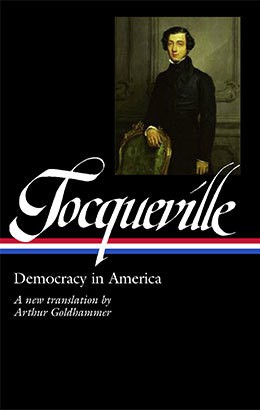During Spring Quarter, visiting scholar and translator Arthur Goldhammer chaired “Reading Tocqueville, Translating Tocqueville”— a lecture on French diplomat, political theorist, and multi-hyphenate Alexis de Tocqueville, held in conversation with Social Sciences faculty and undergraduates taking courses in the Social Sciences Core.

Goldhammer, a four-time winner of the French-American Foundation’s prize for translation, is among the most acclaimed translators working today. His audience broadened in 2013, when his translation of a 700-page tome on income inequality—Thomas Piketty’s watershed Capital in the Twenty-First Century—became an unlikely New York Times bestseller. But among academics, Goldhammer is best-known for his work on Tocqueville, another Frenchman with prescient commentary on American life.
In a twist of fate, this lecture on a French intellectual coincided with a French cultural crisis. As Goldhammer noted in his opening remarks, the talk began while Notre Dame was still aflame. But as the conversation proceeded, the attendees considered intellectual history from a number of different angles, discussing not only the fundamental questions raised by Tocqueville, but by those raised by a liberal arts education. How do we juggle contradictory interpretations of the same text? How do we form a canon? And to borrow the words of another Core heavyweight, Walter Benjamin, how can a translator “allow the pure language [to] shine upon the original all the more fully?”
In all this, the event proved a close reflection of the Social Sciences Core, which rewards close reading and distant reading alike. Mandel Hall proved, in turn, to be a fitting site for the symposium—as moderator and Social Sciences Collegiate Master James Sparrow noted, UChicago’s very first Core lectures were held in the same space.
Henry Connolly, a fourth-year and student in Sparrow’s course “Democracy in America?”, attended the lecture and appreciated its relevance to both current events and his coursework.
“Despite the tragic timing of Dr. Goldhammer’s visit, he maintained incredible composure and delivered a piercing lecture about his work translating hundreds of books, including the words of Tocqueville that we had been reading all quarter,” Connolly said. “In delivering this lecture, Dr. Goldhammer himself embodied the spirit of the Core, which I take to be an unwavering commitment to fundamental texts, in light of any and all modern circumstances.”
As Goldhammer sees it, Tocqueville’s Democracy in America is a case study for the interpretative reading that the Core facilitates. In a phone conversation, he noted how Tocqueville's own identity shaped his writing.
“I think Tocqueville saw himself as a man standing between two worlds—between the aristocratic society into which he was born, and the democratic society which was emerging around him, and which he thought was inevitable,” he commented. “He could not give himself fully to either, but his position in between made him think of himself as a more objective observer, both of the tradition from which he came and the world that he saw emerging around him.”
Goldhammer recalls that Tocqueville’s insights on democracy and inequality felt every bit as relevant in 2003, when he was first approached to translate Tocqueville, as it is today. But the writer’s metaphorical dual citizenship continues to manifest in unexpected ways. The publisher for Goldhammer’s translation—Libraries of America, known for its glossy black dust jackets— was created in homage to France’s own reader library, the Bibliothèque de la Pléiade. Tocqueville was, for that matter, the first foreign author that Libraries of America published.